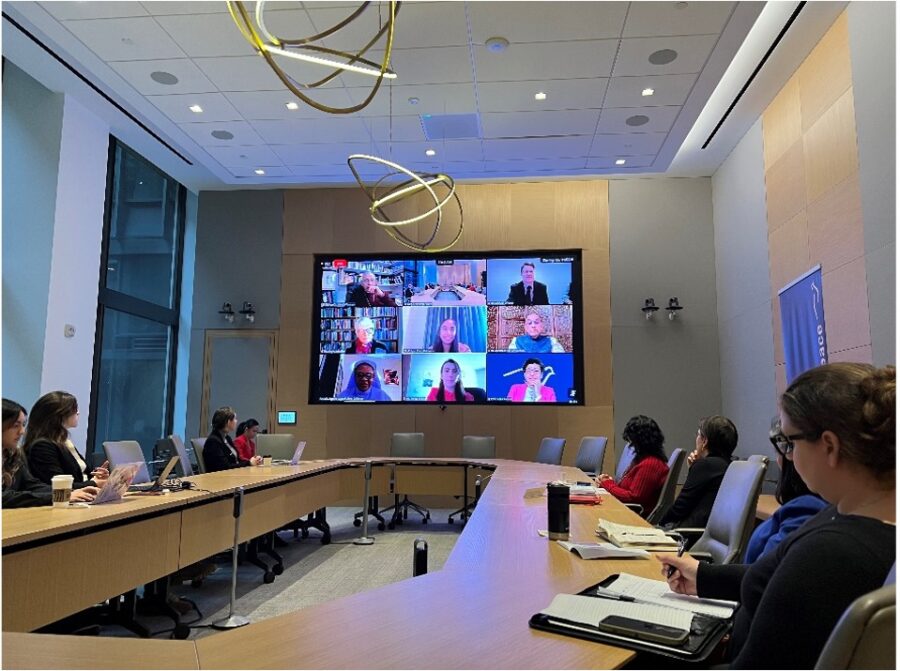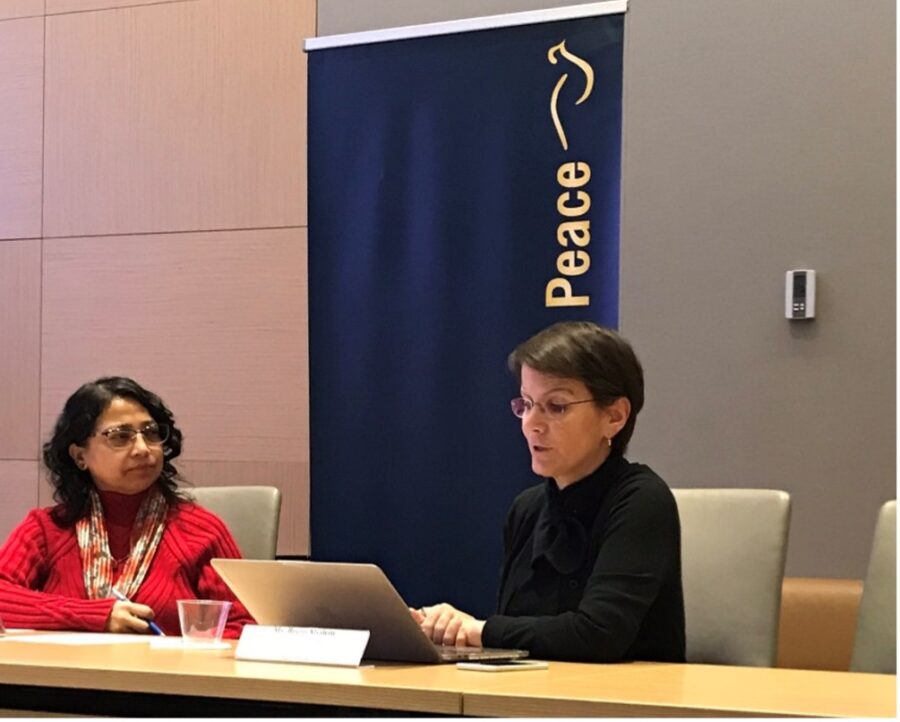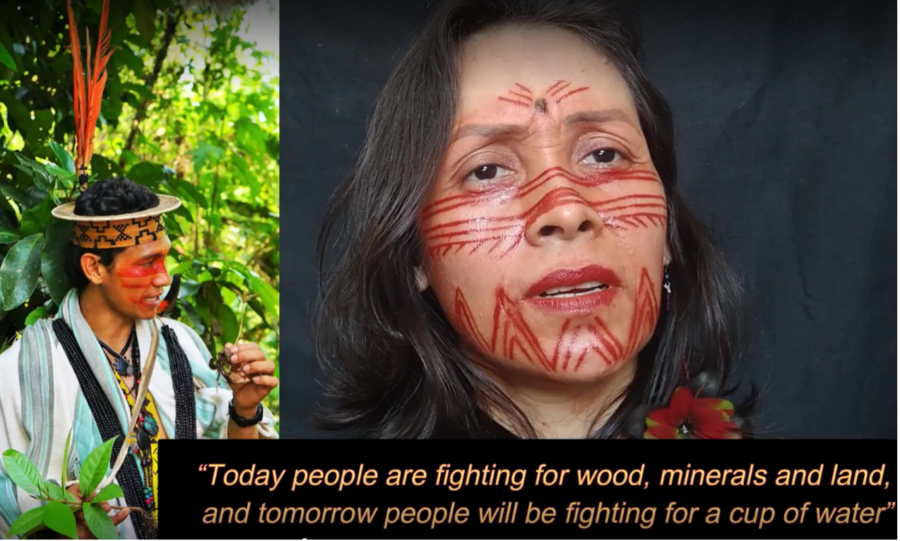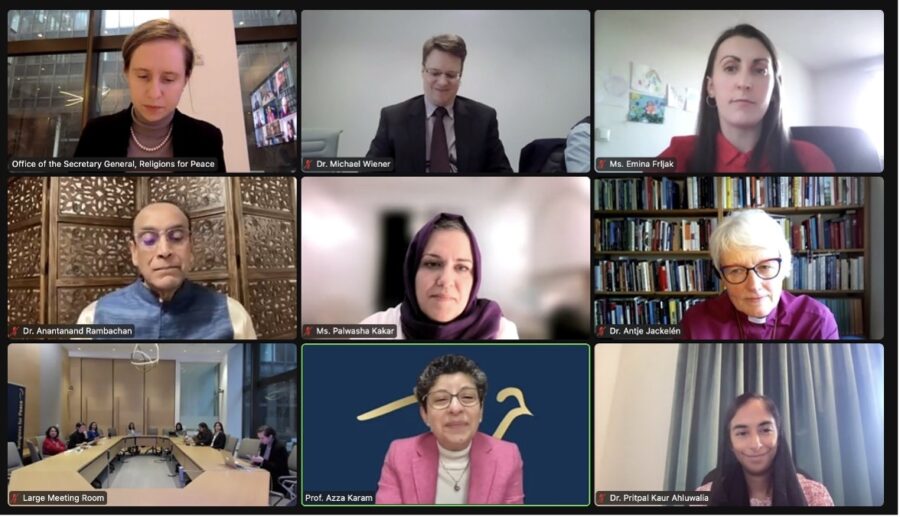Religions for Peace and Partners Hosted the CSW67 Parallel Event on “Working Multi-Religiously for Gender Equality: Reassessing the Role of Education and Knowledge in the Digital Age”
This year, the 67th Commission on the Status of Women (CSW67) focuses on fostering inclusive innovation and technological change and promoting education in the digital age for the achievement of gender equality and the empowerment of all women and girls. On 6 March 2023, UN Secretary General António Guterres launched CSW67, emphasising that, “Women’s rights are being abused, threatened and violated around the world, as centuries of patriarchy, discrimination and harmful stereotypes have created a huge gender gap in science and technology,” citing as an example how women represent only 3% of the Nobel prize winners in those sectors.

In this context, Religions for Peace, in partnership with the United States Institute of Peace (USIP), University for Peace (UPEACE), and the Office of the United Nations High Commissioner for Human Rights (UNOHCHR), hosted the CSW67 parallel event, Working Multi-Religiously for Gender Equality: Reassessing the Role of Education and Knowledge in the Digital Age. Religions for Peace, which brought together leaders and experts from different sectors of society, religions and regions, who evaluated how knowledge and education, powered by diverse theologies, faith traditions, and multi-religious actions, effectively contribute to the advancement of gender equality in the digital age and increase the engagement of women as leaders, alongside their male counterparts.

In her opening remarks, Ms. Reem Alsalem, United Nations Special Rapporteur on Violence Against Women and Girls, Its Causes and Consequences, stressed that “the world continues to suffer from a continued pandemic of violence against women and girls. There is no doubt that technology has allowed marginalised groups to participate meaningfully in society, but at the same time, it has been an engine of perpetuating gender-based violence in ways we have not seen before.” Speaking on the role of faith actors in addressing the impact of technology on gender equality, Ms. Palwasha Kakar, Interim Director for Religion and Inclusive Societies, USIP, noted that “faith actors have informed both advocacy and advancement of human rights, including for women and gender and sexual minorities.” “In the fury of media and hate speech, particularly in the digital age,” she added, “it is easy to forget that religious actors are advocates for human rights and not simply spoilers of change.” Similarly, H.E. Dr. Antje Jackelen, Archbishop Emerita and Primate Emerita, Church of Sweden; Co-President, Religions for Peace, stressed that, “The secular world needs to understand that if they want to address gender inequality and injustice, it needs to engage with faith communities.”
Speaking further on the importance of including faith actors in efforts to advance gender equality, Ms. Emina Frljak, Program Coordinator, Youth for Peace; Member, Religions for Peace International Youth Committee (IYC) , emphasised that, “The added value of faith actors belongs in the multi-faith and multi-stakeholder approach where we leave no one behind. Faith actors are deeply trusted by their communities, and thus present a critical opportunity to achieve sustainable results in the communities they operate.”

In the same vein, Indigenous Peoples are a key stakeholder in efforts to address gender inequality and injustice, climate change, and all other pressing global issues. Stressing that Indigenous Peoples have always regarded Mother Earth as the source of life, sustenance and well-being, Ms. Maria Alexandrina da Silva Pinhanta (Shãtsi), Representative, Ashaninka Indigenous community of Brazil (Apiwxta), shared a message from Mr. Benki Piyãko, President of the Yorenka Tasorentsi Institute, who warned that, “Today people are fighting for wood, minerals and land, and tomorrow people will be fighting for a cup of water.” Furthermore, Ms. Pinhanta deplored the appropriation of Indigenous culture and knowledge, noting that many Indigenous leaders are often detained or imprisoned for using Ayahuasca, “while non-Indigenous Peoples utilise and attempt to patent Ayahuasca as if they owned it.” She elaborated, “Ayahuasca is a traditional beverage of the Asháninka people and other Indigenous peoples – she [Ayahuasca] is our life, and connects us to our spirituality, to the experience of life of the forest, the earth, the water, and the stars,” stressing that, “this is our ancestral knowledge, and only those living in the forest know what it represents for us Indigenous Peoples.”
Among the many changes brought about by the COVID-19 pandemic, the international community bears witness to a surge in the use of digital technologies in all aspects of daily life. While technology has increased opportunities for connectivity, communication, and flexible modalities for learning and working, digital technology has also been weaponised to incite violence and spread hate within and beyond the digital space. In this context, Rev. Sr. Agatha Chikelue, Nun of the Daughters of Mother Mary of Mercy; Co-Chair, Nigerian & African Women of Faith Network, reminded us that, “We live in one world – whatever affects you as a man, affects me as a woman. Digital technology should thus be used as a tool to achieve gender equality for all human beings.” Moreover, Dr. Pritpal Kaur Ahluwalia, Faith and Religious Education Lead, Nishkam School Trust, stressed that, “Gender equality starts with creating safe spaces within the building blocks of everyday life. We must ask ourselves, within our own homes, families, and communities whether women and girls are being provided safe spaces for engagement and leadership.”
On the role of faith actors in advancing gender equality in the digital age, Prof. Anantanand Rambachan, Professor of Religion, St. Olaf College; Co-President, Religions for Peace, reminded us that, “Our religious traditions have not always been consistent advocates for gender equality. Sacred texts and teachings have been interpreted in ways that do not allow women to enjoy the same rights as men. We must challenge the argument that freedom of thought, conscience, and belief justifies gender inequality, and do so unambiguously.” To this end, Ms. Emina Frljak emphasised that, “Faith actors need to change this narrative of oppression, hatred, and inequality by shifting to a narrative of inclusivity, engagement, and gender equality.” Moreover, Hon. Bishop Munib Younan, Bishop Emeritus of the Evangelical Lutheran Church and the Holy Land; Honorary President, Religions for Peace, noted that, “Religious leaders must develop a joint curriculum that allows for a holistic understanding of the similarities and differences of each religion’s teachings on gender equality and gender justice, in order to enhance interreligious and intercultural knowledge of gender equality.” This was echoed by Mr. Ibrahim Salama, Chief, Human Rights Treaties Branch, OHCHR, who emphasised that, “Education is at the heart of transformative gravity, which has not been sufficiently tapped. Inner convictions come from education and because of the complexity of this untapped inner gravity, and the need to be politically correct when dealing with this, we need to work together.” Mr. Salama further noted, “Digital technology, despite the double-edged sword, helps communities defy conventional limitations on accessibility and communication, among other aspects of daily life.” Similarly, H.E. Dr. David Fernández Puyana, Ambassador, Permanent Observer of the UPEACE to the United Nations Office in Geneva, highlighted that “new technologies are an opportunity to change conventional ideas, and ultimately result in the full enjoyment of human rights by all.”

In concluding the discussion, Prof. Azza Karam, Secretary General, Religions for Peace, emphasised that, “Nothing compares to, or beats, the ability to work collaboratively, to pool resources together… and this is the imperative for the advancement of gender equality in the digital age.” As we celebrate Women’s History Month, it is critical that we work multi-religiously and multilaterally to challenge the power and norms within leadership of all sectors and harness the resources and opportunities within the digital space to transform prevailing patriarchies, especially in the context of humanitarian emergencies.
As part of Religions for Peace’s collaboration with USIP, UPEACE, and UNOHCHR on the theme of Religions, Beliefs, and Human Rights: A ‘Faith for Rights’ Approach, this official CSW67 parallel event falls under the analytical celebration of the 75th anniversary of the Universal Declaration of Human Rights. Since December 2022, Religions for Peace, USIP, UPEACE, and UNOHCHR have been convening a series of monthly events, linking thematically to the courses of the USIP Global Campus as well as the work of Religions for Peace’s Interfaith Councils and its Religions and Peace Academy Online Course.